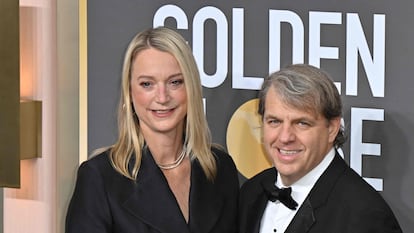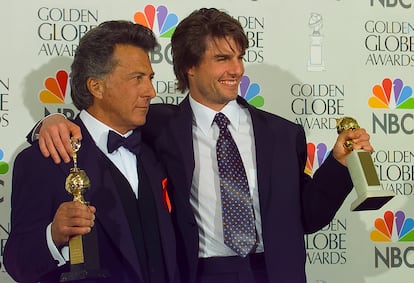Golden Globes, the reboot: Can investor Todd Boehly make the awards shine again?
The Hollywood ceremony is reinventing itself as a for-profit enterprise to move past its lack of diversity and management controversy


Hollywood is a great place to reinvent yourself. That is also the aim of the Golden Globes, one of the most prestigious awards in the entertainment industry. Ownership of the awards — organized since 1944 by the controversial Hollywood Foreign Press Association — has now been taken over by a private company. The HFPA was at the center of criticism for its lack of diversity and mismanagement by some of its members. After a couple of years of controversy, the Golden Globes will remain in the celebrity sphere as a for-profit event. Despite their reputation being somewhat tarnished, the awards are still a golden brand in the industry.
The California attorney general this week accepted the business proposal made two years ago by Eldridge Industries, a powerful investment fund. Its portfolio includes insurance, technology, real estate and various entertainment businesses ranging from the music catalogs of Bruce Springsteen and The Killers to Los Angeles’ two most beloved sports teams, the Dodgers and the Lakers. Its founder and CEO, Todd Boehly, an entrepreneur whose fortune is worth around $5.3 billion, has also shown an appetite for foreign markets. In a record-breaking deal last year he bought Chelsea F.C., an English Premier League soccer club.
Boehly, 49, wants to breathe new life into the Globes. “People haven’t realized that the HFPA has an 80-year-old governing body. It is very difficult. Every time they have to adjust their rules they end up fighting over minor details,” he recounted in a conversation with financier Michael Milken in early May. “They have a rule where they need five days to call a meeting. That’s because 80 years ago you had to get to Los Angeles on your horse and buggy. They haven’t changed it because they can’t agree whether six or eight hours is better,” the tycoon added.
In the discussion, Boehly also spoke about the journalists who were part of the organization’s leadership. “The journalism business has been hit hard, so they didn’t want to expand the governing body because they were afraid it would affect their livelihood,” said the man who has acted as interim CEO of the Golden Globes from October 2021. The original 87 members (later expanded to 96) devoted themselves to managing the resources of a non-profit organization rather than “using their ability to write and sell Hollywood stories in every overseas market.”
In February 2021, the Los Angeles Times published an investigation that rattled the small but powerful HFPA group. As its starting point the revelation took a lawsuit filed by European journalists who had applied to join the exclusive club and had been rejected. It was not the first time it had happened, but the report in the Los Angeles newspaper also stated a fact that was unsustainable in today’s Hollywood: There was not a single Black member among its nearly 100-strong governing body.

This triggered a strong reaction. Over a hundred publicists, the vital link between the stars and the press, turned their backs on the organization and demanded a change. The real blow came when Hollywood’s most visible power, its stars, joined them. Tom Cruise returned his awards and Scarlett Johansson called for a boycott of the organization, which she called sexist. Brendan Fraser also said he had been sexually harassed by an HFPA president. African-American producers Shonda Rhimes and Ava Duvernay, the creators of several television hits, requested that their ties with the group be cut. NBC (the network that broadcasts the awards) echoed the criticism and said that it would not broadcast the 2022 ceremony, which was utterly discredited.
The Golden Globes returned to screens in 2023. It was possible because the organization was reformed after being the object of so much scorn. The awards included new international voters (now 310) to increase diversity; some members were sanctioned, and others were dismissed. New ethical guidelines were issued. Organizers paid half a million dollars to have Jarrod Carmichael (a Black gay comedian) emcee the ceremony. He made fun of the organization in the monologue that kicked off the 80th edition: “I wouldn’t say they’re racist, but they didn’t have a single Black member before George Floyd died. I’ll let you be the judge,” he said.
The clout that the old organization has with the new owners is in doubt. The company’s statement devoted just over 20 words to the old order. “We are very excited to close this anticipated transaction and begin the transition from a membership organization to a commercial enterprise,” said HFPA President Helen Hoehne.
The financial terms of the transaction have not been disclosed. The awards will come under the umbrella of Dick Clark Productions, a company also owned by Eldridge that produces the annual television broadcast of the gala. The resources that are still in the HFPA’s coffers, earned in part from the sale of broadcasting rights, will be transferred to a charitable foundation.
Boehly believes that with the transition to a for-profit company it will be easier to hold the Golden Globes and its employees accountable. A number of the original HFPA members have been hired on a salary of $75,000 per year. Duties will include organizing features of films and series submitted for voter consideration and writing content for the organization.
Less clear are the ethical limits that the new company will have. Having been turned into a ceremony that aims to generate revenue, the Golden Globes has not unveiled its new ethical rules. Eldridge owns Variety and The Hollywood Reporter, doyens of the entertainment industry’s publications and recipients of much of the awards-season publicity for productions.
There may also be a conflict of interest. Boehly’s fund is a minority owner of A24, the independent production company that has become a Hollywood success story. The tycoon injected $90 million in seed capital in 2012. Last year, the company received a new investment of $225 million and came close to a valuation of $2.5 billion. Everything Everywhere All at Once, produced by A24, won seven Oscars a few months ago, including Best Picture. Boehly has said he intends to turn the Golden Globes into a channel to promote the best of the best in Hollywood. Will this include products from his own huge portfolio?
Sign up for our weekly newsletter to get more English-language news coverage from EL PAÍS USA Edition
Tu suscripción se está usando en otro dispositivo
¿Quieres añadir otro usuario a tu suscripción?
Si continúas leyendo en este dispositivo, no se podrá leer en el otro.
FlechaTu suscripción se está usando en otro dispositivo y solo puedes acceder a EL PAÍS desde un dispositivo a la vez.
Si quieres compartir tu cuenta, cambia tu suscripción a la modalidad Premium, así podrás añadir otro usuario. Cada uno accederá con su propia cuenta de email, lo que os permitirá personalizar vuestra experiencia en EL PAÍS.
¿Tienes una suscripción de empresa? Accede aquí para contratar más cuentas.
En el caso de no saber quién está usando tu cuenta, te recomendamos cambiar tu contraseña aquí.
Si decides continuar compartiendo tu cuenta, este mensaje se mostrará en tu dispositivo y en el de la otra persona que está usando tu cuenta de forma indefinida, afectando a tu experiencia de lectura. Puedes consultar aquí los términos y condiciones de la suscripción digital.








































